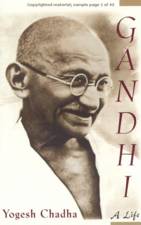

| Click on a book's image or title to order from Amazon.com |

Gandhi: A Life
by Yogesh ChadhaJohn Wiley & Sons, Inc., HC, © 1997, 503 pp, ISBN #0-471-24378-7
Reviewed February 2003
Mohandas Karamchand Gandhi has interested me for a while, being both the man who stood up to the British Empire, and the man who inspired America's Martin Luther King, Jr. I wanted to learn more about him than the broad impressions scattered about western culture. Chadha's biography of Gandhi attracted me because it's recent. Not that earlier or contemporary biographies would necessarily be inferior, but I wanted exposure to the man from someone with our own vantage point on history.
What's peculiar about Gandhi: A Life is that Chadha doesn't really provide a vantage point, or a point of view. One of his main goals was to provide an accurate account of Gandhi's life, leaving out some material "for want of authenticity". I think he went too far, providing little more than cold, hard facts. While there's something to be said for letting the reader draw his own conclusions, providing some guidance and interpretation (and even criticism of other interpretations) is itself an invaluable part of a biography. Lacking that element, this book feels like it's missing something crucial.
Chadha does a good job of providing those facts, particular in the earlier parts of Gandhi's life. Not surprisingly, there's more here about his later life, but his earlier life feels more fully described, especially regarding Gandhi's personality. Some of his formative experiences, including his commitment to vegetarianism and his oppression as an Indian in South Africa are vividly described. The birth of his approach to peaceful protests and non-violent noncooperation is also described in detail.
But as Gandhi's life progresses, after his return to India and involvement in and eventual leadership of the Indian independence movement, the narrative starts to have some perplexing gaps in it. For example, at one point Gandhi stops speaking on Monday, but the reason for this silence is not - that I could find - provided. The blunder by the Indian National Congress during World War II where they effectively yielded the voice of independence to the Muslims is also not well-explained. Biographies aren't just about what happened, but about why things happened. Sometimes this requires some conjecture or circumstantial evidence to attempt, and it's largely missing here.
The book concludes with several chapters about the plot (if you can call it that, as the plotting seemed weak at best) to assassinate Gandhi. The assassins' motives were fairly mundane (they were Hindus who loathed Gandhi's - to their eye - appeasement of the Muslims), and the details of their efforts lend nothing to our understanding of Gandhi or how others perceived him. It's the weakest part of the book, and a tremendous anticlimax.
All of this is not to say that Gandhi is without value. It's a dense and information-rich volume, and I certainly feel I was not shortchanged in the explanation of the political situations in South Africa circa 1900 or India in the 30 years leading up to independence. Gandhi's travels are amply chronicled, and many excerpts from his personal writings or statements are reproduced, lending some color to his thoughts. Chadha does accomplish one of his goals in depicting Gandhi's flaws alongside his virtues. Although his dedication to peacefulness and brotherhood is admirable, he also comes across as decidedly pig-headed, sometimes self-destructively so. (This also seems to be how the British often felt.)
(On the other hand, I've heard that Gandhi was a witty individual, and if so, that doesn't come across in this book at all.)
In the end, though, I found Gandhi: A Life a bit disappointing, and hard to get through in places. Dedication to the facts and basic presentation only go so far, and I was looking for more than I found here.
hits since 16 February 2003.